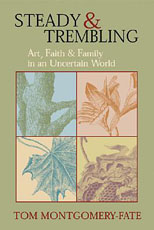Tom Montgomery-Fate is a professor of English at College of DuPage in Glen Ellyn, Illinois. He has taught with his wife in the Philippines, attended seminary, and written a collection of essays about the Nicaraguan revolution and the split in the Catholic Church. His work has aired on National Public Radio, Chicago Public Radio, and has appeared in the Chicago Tribune, The Boston Globe, Puerto Del Sol, Manoa, and many other journals. In this collection of exquisitely written essays, Montgomery-Fate mines the many meanings he discovers in the natural world, family, art, and society. He states:
"A life in art is also 'steady and trembling' — an unpredictable, illogical pursuit of connection, of relation, with self and family and the whole of creation, while trying to live in the 'constant presence of process.' Yet while I understand the trembling part, I'm still unsure how to steady myself in a three-child, two-job, too busy, high-expectation 'normal' life; in an ever-accelerating, ultra-compartmentalized, 24/7 world, where success is increasingly defined by productivity and accessibility, where to slow down is to lose or fail. Our creative search for meaning — for connection with our children, our partners, God — must compete with our 'to do' lists, with the lure of money, with the lie that we can buy back the time we have already squandered to our hectic schedules and the ever-expanding dream of economic security.
"The problem is that when we download our lives on a palm planner, the preprogrammed beeps, the digitized 'mind,' leads us only into the future, rather than the presence we seek. In a world of 'never-enoughness,' we often miss the gaps in the clouds, the openings, those apertures of meaning that would light the way."
Luckily for us and for his loved ones, Montgomery-Fate does not miss the wonders and the many marvels that pass through his senses; he filters them through his consciousness and a spiritual perception of things. He sits in the henhouse and waits for words. He ponders poems by Howard Nemerov and Mary Oliver. He listens to the faint rhythms of his children breathing in their bedrooms. He makes good use of his seed file to spur his thoughts as he writes. He looks to his kids to "teach me how to slow down enough to discern the limits of an autopiloted life." He explores the difference between worry, which he calls "the half-empty glass of the future," and wonder. He makes sure not to miss taking a look at the lilies in the woods. He examines the death of a goldfinch. He participates in a sweat lodge ritual. He muses on E. B. White's Charlotte's Web and the power of miracles.
What keeps him steady in this world that engenders so much fear and trembling? A Christian faith that doesn't shy away from mystery, vulnerability, and imperfection. A reverence for the natural world. And a keen sense of being open to whatever shows up in his experience. These essays shine, and it is easy to see why they are read on the radio.
